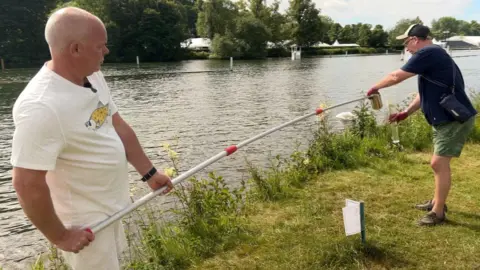By James Ingham, BBC News
 PA
PAConcerns have been raised about levels of E.coli in the River Thames ahead of Henley Royal Regatta.
Campaign group River Action said its water sampling by citizen scientists near Fawley Meadows showed “alarmingly high levels” of E.coli bacteria which can cause serious infections.
Thames Water, whose own sampling showed lower levels, said the study was “alarmist”.
Regatta organisers have issued guidance to participants on “minimising the risk of illness due to proximity to polluted water.”

Four hundred races are staged over a course of one mile 550 yards (2,112m) during the world-renowned Henley Royal Regatta which begins on Tuesday.
River Action said its figures showed levels of E.coli reached 25,000 CFU (colony forming units) per 100ml on a single day – 19 June – more than 27 times higher than the level the Environment Agency grades as poor.
Testing on other days showed results varying between 265 and 8001 CFU per 100ml. Bathing water is graded as poor at 900 CFUs.
James Wallace, chief executive of River Action demanded steps are taken to halt the “deluge of raw sewage” into the Thames.
“The testing locations suggest that the source of pollution is from Thames Water discharging treated effluent containing bacteria, and untreated sewage directly into the river and its tributaries.
“As we saw at the recent university Boat Race in London on the River Thames, there is a risk that rowers can become unwell from waterborne pathogens, which not only affects their race but puts their health and sport at risk.”
‘Alarmist approach’
The utility company said it began its own testing of water quality every other day at Marsh Lock and Hambleden Lock which would provide “representative samples” to assess the quality of river water as it flowed through Henley.
Thames Water said it saw spikes in E.coli readings on two days in May and two days in June following rainfall, adding that “multiple sources are likely to have contributed to these elevated readings, which could include farming, industry, road runoff and wildlife”.
The company claims that no untreated effluence has been discharged from the nearby treatment works since May 14, which is prior to River Action starting their sampling.
“What these laboratory tested results show so far is that E.coli levels in the Henley stretch of the Thames are consistently achieving levels the Environment Agency would deem as ‘Good’ for bathing waters, during dry conditions.
“We need honest and balanced debate that recognises the range of factors impacting river health, rather than an alarmist approach that tries to apportion blame in a misguided way,” it added.
The two sites where Thames Water took its samples were 2km upstream and 5km downstream from the River Action site which was nearer sewage treatment works.
Andrew Singer, principle scientist at the UK Centre for Ecology and Hydrology said both sets of figures were both “probably accurate”.
“Sampling the same stretch of river not at the same time means you can generate two datasets that don’t agree with each other.
“The river by its very nature is a moving object and you are not going to be sampling the same thing twice.”
He said the impact on the regatta would depend on weather conditions during the week.
“What we saw in the data is that higher E.coli counts track rainfall.
“If it’s a wet regatta expect that more E.coli is going to be in the river. Any E-coli consumption is going to have a risk with it.”
 PA Media
PA Media‘Stark reminder’
Organisers of the Henley Royal Regatta have issued advice to rowers including covering cuts and grazes, not swallowing river water, cleaning equipment thoroughly and not throwing crew members in the river in celebration.
Olympic rower and chair of the Henley Royal Regatta’s management committee, Sir Steve Redgrave said River Action’s findings were a “stark reminder of the impact that sewage pollution is having on our rivers”.
“Henley Royal Regatta supports the research undertaken by River Action, which highlights the essential work that needs to be done to improve the cleanliness of our waterways for all to enjoy,” he said.


